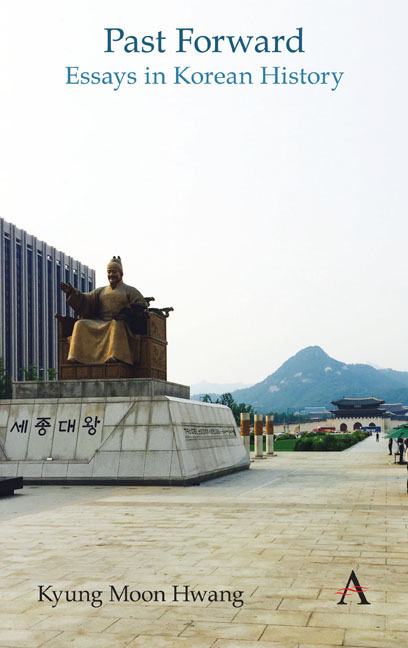Book contents
- Frontmatter
- Contents
- List of Figures
- Foreword
- Chronologies of Korean History
- Themes
- Acknowledgments
- Note on Romanization and Spelling
- Part I Circulating History
- Part II Durable Traditions
- Part III Ancient Remains
- Part IV Dynastic Depths
- Part V Modern Origins
- Part VI Challenges of Nationhood
- Part VII History Makers
- 41 Demythologizing King Sejong the Great
- 42 Modern Lady Shin Saimdang
- 43 Five Potential National Heroes
- 44 A Portrait of Great Painters
- 45 Four Young Men from 1884
- 46 Na Hye-seok
- 47 Hyundai Motors and Chung Ju-yung
- 48 Yun Isang and the East Berlin Case
- 49 Ri Young-hee, Iconoclast for Democracy
- 50 Kim Young Sam's Broad Historical Appeal
- 51 Kim Dae Jung's Historic Election
- Part VIII External Presences
- Part IX Trials of Modernization
- Part X Gripped by the Past
- Index
41 - Demythologizing King Sejong the Great
from Part VII - History Makers
- Frontmatter
- Contents
- List of Figures
- Foreword
- Chronologies of Korean History
- Themes
- Acknowledgments
- Note on Romanization and Spelling
- Part I Circulating History
- Part II Durable Traditions
- Part III Ancient Remains
- Part IV Dynastic Depths
- Part V Modern Origins
- Part VI Challenges of Nationhood
- Part VII History Makers
- 41 Demythologizing King Sejong the Great
- 42 Modern Lady Shin Saimdang
- 43 Five Potential National Heroes
- 44 A Portrait of Great Painters
- 45 Four Young Men from 1884
- 46 Na Hye-seok
- 47 Hyundai Motors and Chung Ju-yung
- 48 Yun Isang and the East Berlin Case
- 49 Ri Young-hee, Iconoclast for Democracy
- 50 Kim Young Sam's Broad Historical Appeal
- 51 Kim Dae Jung's Historic Election
- Part VIII External Presences
- Part IX Trials of Modernization
- Part X Gripped by the Past
- Index
Summary
Hangul Day, on October 9, commemorates what is generally considered the nation's greatest cultural accomplishment, the Korean alphabet, and its most revered historical figure, King Sejong the Great, extolled as the epitome of the “sage king.” The strength of this legend is understandable; King Sejong was indeed a great man, and Koreans are no different from most other nations today that mythologize their heralded leaders from the past. But to truly appreciate Sejong's historical significance, it seems wise to demythologize him and his achievements a bit.
We can begin with the alphabet itself. Koreans have come to believe that hangul is the most accomplished writing system ever devised, the consummate blend of art and science. It is indeed wonderfully precise and flexible, but its relative merits are difficult to assess. It perfectly captures the Korean language, to be sure, and it appears to do well in expressing a foreign language like Japanese. For conveying other languages such as Chinese or English, however, hangul seems not as well suited. This makes perfect sense, for King Sejong and his scholars were not interested in creating a universal alphabet, just one that would match well the Korean language. And they did.
What of the claim that the script (called Hunmin Jeongeum when it was promulgated in 1446) arose from only scientific principles, that it was autonomously created? This may be what the Korean documents suggest, but specialists have pointed out the following: In world history, alphabetical writing, like writing itself, tended to get easily transmitted because of its wondrous utility. And Korean elites of that era could not have been ignorant of other alphabetical scripts, such as the Mongol writing system, particularly during the period of Mongol domination in the thirteenth and fourteenth centuries. To acknowledge that the great king borrowed from other scripts in creating the Korean alphabet would not minimize his feat, but rather acknowledge his wisdom and learning. The same goes for his other achievements. Indeed, if we step away from the nation-centered perspective on King Sejong, we can gain a fuller understanding of his impact.
It is well known, for example, that King Sejong encouraged innovations in science and technology. Korean schoolchildren can recite the long list of impressive inventions that he fostered.
- Type
- Chapter
- Information
- Past ForwardEssays in Korean History, pp. 121 - 123Publisher: Anthem PressPrint publication year: 2019

